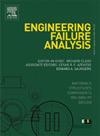Modeling of damage interaction due to uniaxial creep and subsequent LCF pure torsional loading
IF 4.4
2区 工程技术
Q1 ENGINEERING, MECHANICAL
引用次数: 0
Abstract
This paper presents experimental results of creep-rupture, preliminary creep and low-cycle torsional fatigue of 2024 aluminum alloy. It analyzes the effect of pre-deformation on fatigue life under pure, cyclic torsion loading conditions. Two different pre-deformation levels were considered in the creep process at 200 °C and 300 °C. A significant influence of creep pre-deformation on the cyclic properties of the tested material was obtained. This influence was characterized by, above all, improvement of fatigue life (during strain-controlled loading) of pre-deformed material in the case of large plastic strains. Two damage accumulation models were presented on the basis of these experimental test results. One makes it possible to determine the material’s damage state in the axial creep process. The other allows for predicting of fatigue life under low-cycle torsion conditions for the as-received material and material with different creep pre-deformation histories.
求助全文
约1分钟内获得全文
求助全文
来源期刊

Engineering Failure Analysis
工程技术-材料科学:表征与测试
CiteScore
7.70
自引率
20.00%
发文量
956
审稿时长
47 days
期刊介绍:
Engineering Failure Analysis publishes research papers describing the analysis of engineering failures and related studies.
Papers relating to the structure, properties and behaviour of engineering materials are encouraged, particularly those which also involve the detailed application of materials parameters to problems in engineering structures, components and design. In addition to the area of materials engineering, the interacting fields of mechanical, manufacturing, aeronautical, civil, chemical, corrosion and design engineering are considered relevant. Activity should be directed at analysing engineering failures and carrying out research to help reduce the incidences of failures and to extend the operating horizons of engineering materials.
Emphasis is placed on the mechanical properties of materials and their behaviour when influenced by structure, process and environment. Metallic, polymeric, ceramic and natural materials are all included and the application of these materials to real engineering situations should be emphasised. The use of a case-study based approach is also encouraged.
Engineering Failure Analysis provides essential reference material and critical feedback into the design process thereby contributing to the prevention of engineering failures in the future. All submissions will be subject to peer review from leading experts in the field.
 求助内容:
求助内容: 应助结果提醒方式:
应助结果提醒方式:


